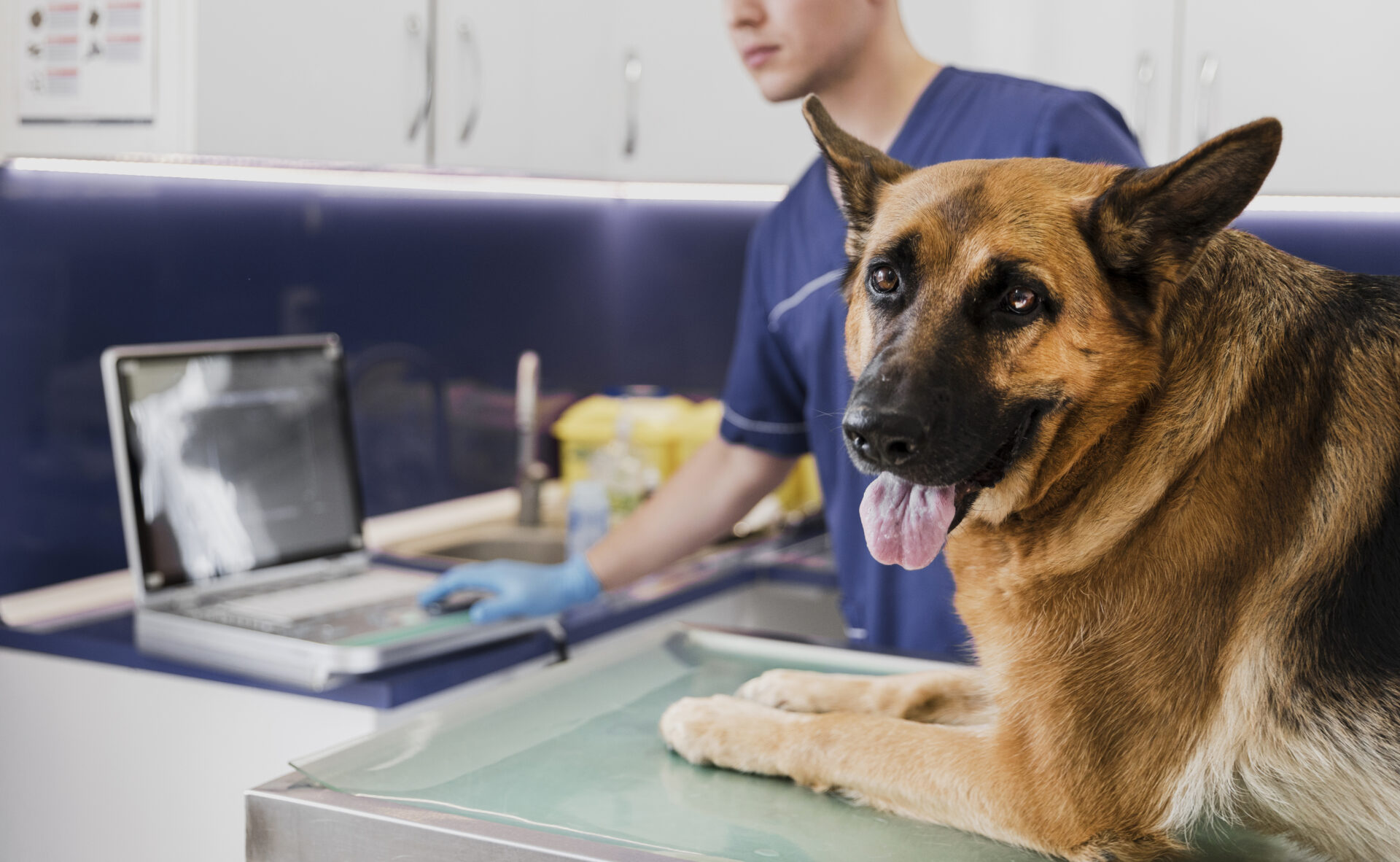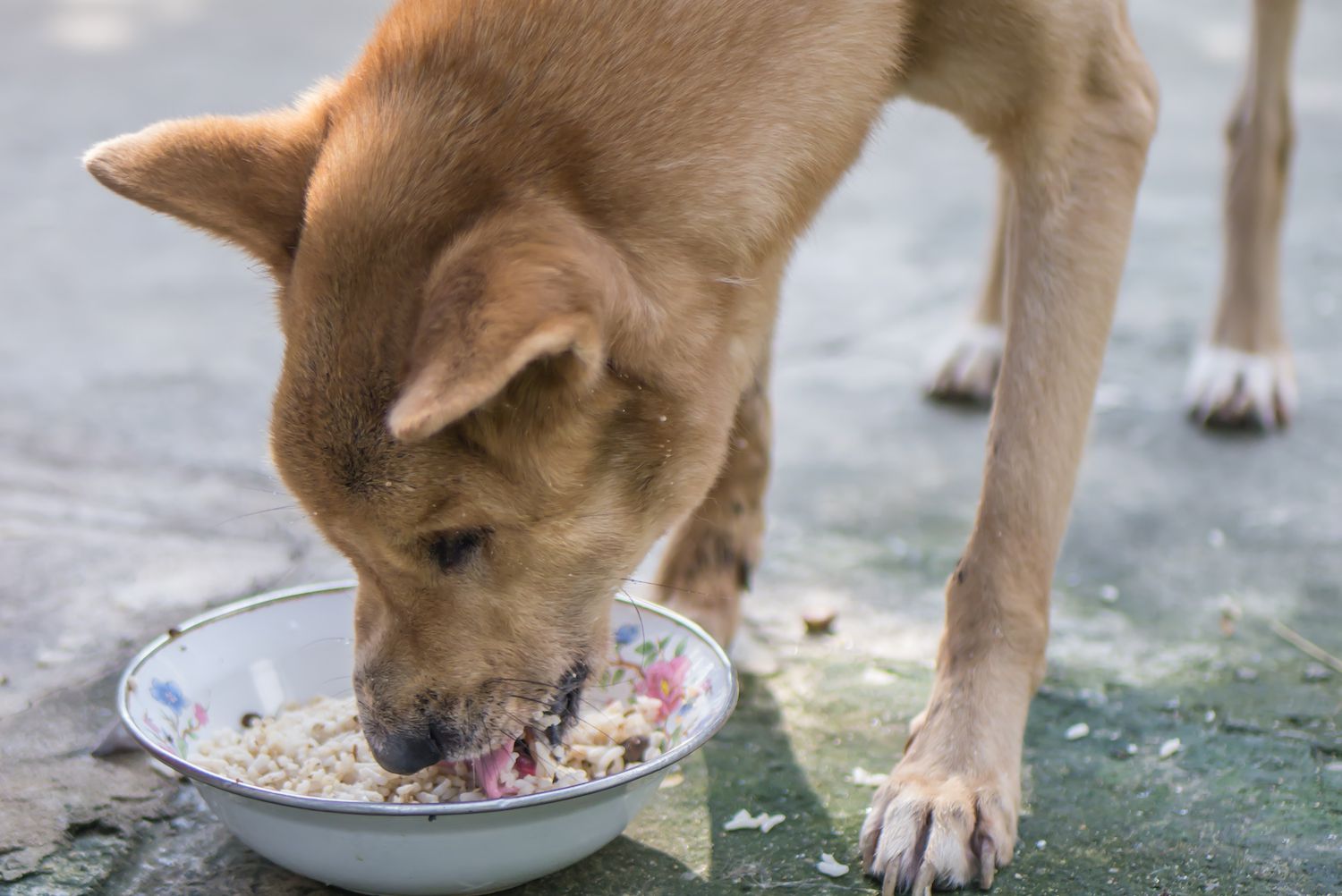Home>Health & Wellness>Nutrition & Diet>What Should A Diet For A Dog With Cancer Consist Of


Nutrition & Diet
What Should A Diet For A Dog With Cancer Consist Of
Published: January 28, 2024
Discover the essential components of a cancer diet for dogs, including the crucial role of nutrition and diet in supporting their health and well-being. Learn how to provide the best dietary support for your dog's cancer treatment.
(Many of the links in this article redirect to a specific reviewed product. Your purchase of these products through affiliate links helps to generate commission for Pawsomeoldies.com, at no extra cost. Learn more)
Table of Contents
Introduction
When a beloved furry friend is diagnosed with cancer, it can be a distressing and challenging time for pet owners. Alongside medical treatments, the role of nutrition in supporting the health and well-being of dogs with cancer is increasingly recognized as a crucial aspect of their care. A carefully tailored diet can play a significant role in managing the symptoms, supporting the immune system, and enhancing the overall quality of life for dogs battling cancer.
Understanding the unique nutritional needs of dogs with cancer is essential for providing them with the best possible care. A well-designed diet can help mitigate the side effects of cancer treatments, maintain muscle mass, and optimize the body's ability to combat the disease. By focusing on specific nutrients and dietary strategies, pet owners can actively contribute to their canine companions' comfort and resilience during this challenging time.
In this comprehensive guide, we will delve into the intricacies of crafting a suitable diet for dogs with cancer. From protein and fat requirements to the importance of micronutrients and feeding guidelines, we will explore the key components that make up an optimal diet for dogs facing the battle against cancer. By gaining insights into the nutritional needs of dogs with cancer, pet owners can empower themselves to make informed decisions and provide the best possible support for their furry friends.
Read more: What Should Your Dog’s Diet Consist Of
Understanding the nutritional needs of a dog with cancer
When a dog is diagnosed with cancer, the disease can significantly impact their nutritional requirements and overall well-being. Cancer can exert various effects on a dog's body, including alterations in metabolism, increased energy expenditure, and changes in nutrient utilization. Understanding the nutritional needs of a dog with cancer is crucial for devising a diet that supports their health and aids in managing the disease.
Cancer can lead to a state of malnutrition in dogs, characterized by weight loss, muscle wasting, and a decline in overall body condition. The metabolic demands of the disease may elevate the dog's energy and nutrient requirements, necessitating a diet that provides adequate calories, essential nutrients, and supportive compounds. Additionally, cancer and its treatments can induce side effects such as nausea, decreased appetite, and alterations in taste perception, further complicating the nutritional status of affected dogs.
In the context of cancer, the nutritional goals for dogs extend beyond mere sustenance. A well-crafted diet aims to address specific challenges associated with the disease, such as combating inflammation, supporting the immune system, and preserving lean body mass. Moreover, the diet should be tailored to the individual dog's needs, considering factors such as the type of cancer, stage of the disease, concurrent treatments, and any pre-existing health conditions.
Key considerations in understanding the nutritional needs of a dog with cancer include the following:
-
Energy requirements: Dogs with cancer may have increased energy needs due to the metabolic demands of the disease and potential weight loss. Providing a diet with adequate calories is essential for maintaining energy levels and preventing further muscle wasting.
-
Protein needs: Protein is crucial for supporting muscle mass, immune function, and tissue repair. Dogs with cancer may require higher levels of quality protein to counteract muscle loss and aid in the body's healing processes.
-
Fat and carbohydrate metabolism: Cancer can influence the way a dog's body utilizes fats and carbohydrates. Understanding these metabolic changes is important for optimizing the macronutrient composition of the diet to support the dog's energy requirements and overall health.
-
Micronutrient support: Certain vitamins, minerals, and antioxidants play vital roles in immune function, cellular protection, and overall health. Tailoring the diet to include specific micronutrients can help bolster the dog's resilience and aid in managing the effects of cancer.
By comprehensively understanding the nutritional needs of dogs with cancer, pet owners and caregivers can lay the groundwork for formulating a diet that addresses the unique challenges posed by the disease. This knowledge forms the basis for crafting a supportive and nourishing diet that can positively impact the well-being and quality of life of dogs battling cancer.
Protein requirements for dogs with cancer
Protein plays a pivotal role in supporting the health and well-being of dogs with cancer. As the body's primary building blocks, proteins are essential for maintaining muscle mass, supporting immune function, and facilitating tissue repair – all of which are particularly crucial for dogs battling cancer.
In the context of cancer, dogs may experience a condition known as cancer cachexia, characterized by muscle wasting and weight loss. Adequate protein intake is vital for combating these effects, as it helps preserve lean body mass and supports the dog's overall strength and vitality. Additionally, protein serves as a source of essential amino acids, which are the building blocks of various cellular components and play key roles in immune function and healing processes.
When formulating a diet for a dog with cancer, it is important to prioritize high-quality protein sources. These may include lean meats such as chicken, turkey, and fish, which provide essential amino acids and are easily digestible. Incorporating protein-rich foods into the dog's diet can help mitigate muscle loss, promote tissue repair, and contribute to an overall sense of well-being.
Furthermore, the protein requirements for dogs with cancer may be higher than those for healthy dogs due to the body's increased demand for amino acids and the need to counteract muscle wasting. This underscores the importance of ensuring that the dog's diet contains sufficient levels of protein to support their unique nutritional needs during this challenging time.
In addition to considering the quantity of protein, the quality of the protein sources is equally significant. High-quality proteins contain a balanced profile of essential amino acids, which are crucial for supporting the dog's immune system and aiding in the body's recovery processes. By prioritizing the inclusion of premium protein sources in the dog's diet, pet owners can actively contribute to their canine companion's nutritional well-being and resilience in the face of cancer.
In summary, the protein requirements for dogs with cancer are heightened due to the body's increased demand for essential amino acids and the need to combat muscle wasting. By incorporating high-quality protein sources into the dog's diet, pet owners can play a vital role in supporting their furry friend's muscle mass, immune function, and overall health during the challenging journey of battling cancer.
Fat requirements for dogs with cancer
Fat plays a crucial role in the diet of dogs with cancer, serving as a concentrated source of energy and contributing to various physiological functions within the body. When formulating a diet for dogs battling cancer, understanding the specific fat requirements is essential for addressing their unique nutritional needs and supporting their overall well-being.
In the context of cancer, the metabolic demands and energy requirements of affected dogs may be heightened. Fat serves as a dense source of calories, providing the necessary energy to fuel the body's functions and support the dog's overall vitality. Additionally, certain types of fats, such as omega-3 fatty acids, have been recognized for their anti-inflammatory properties and potential benefits in managing the symptoms of cancer and its treatments.
Moreover, dogs with cancer may experience changes in their fat metabolism, potentially impacting their ability to effectively utilize dietary fats. Understanding these metabolic alterations is crucial for tailoring the fat composition of the dog's diet to optimize their energy utilization and support their nutritional requirements.
When selecting fat sources for dogs with cancer, it is important to prioritize healthy, high-quality fats. This may include incorporating sources of omega-3 fatty acids, such as fish oil or flaxseed oil, which have been associated with anti-inflammatory effects and may aid in managing the inflammatory processes associated with cancer. Additionally, ensuring a balanced ratio of omega-3 to omega-6 fatty acids is important for supporting overall health and immune function.
Incorporating moderate amounts of healthy fats into the dog's diet can contribute to their energy levels, support their body's metabolic processes, and potentially alleviate certain symptoms associated with cancer and its treatments. However, it is crucial to strike a balance and avoid excessive fat intake, as this can lead to weight gain and other health complications.
By understanding the specific fat requirements of dogs with cancer and selecting appropriate fat sources, pet owners can actively contribute to their furry friend's nutritional support and overall well-being during the challenging journey of battling cancer. Prioritizing healthy fats and tailoring the fat composition of the dog's diet to their individual needs can play a significant role in supporting their energy levels, metabolic function, and overall resilience in the face of cancer.
Carbohydrate requirements for dogs with cancer
Carbohydrates are a fundamental component of a dog's diet, providing a readily available source of energy and serving as a key contributor to overall metabolic function. When considering the specific nutritional needs of dogs with cancer, understanding the role of carbohydrates in their diet is essential for devising a supportive and well-balanced nutritional plan.
In the context of cancer, the metabolic demands and energy requirements of affected dogs may be altered. While dogs are known to be primarily carnivorous, carbohydrates play a significant role in providing accessible energy for various physiological processes, including cellular metabolism and organ function. Additionally, carbohydrates can serve as a source of dietary fiber, which plays a crucial role in digestive health and may aid in managing certain gastrointestinal symptoms that can arise during cancer and its treatments.
When formulating a diet for dogs with cancer, the selection of carbohydrate sources should prioritize complex carbohydrates that offer sustained energy release and contribute to overall nutritional balance. This may include incorporating whole grains, legumes, and vegetables, which provide a spectrum of essential nutrients and dietary fiber. By opting for complex carbohydrates, pet owners can ensure that their canine companions receive a steady and sustained supply of energy, supporting their metabolic needs and overall well-being.
Furthermore, the glycemic index of carbohydrates, which reflects their impact on blood sugar levels, is an important consideration in the context of cancer. Selecting carbohydrates with a lower glycemic index can help mitigate potential fluctuations in blood sugar levels and support a more stable energy supply for dogs with cancer. This is particularly relevant in managing the potential side effects of cancer treatments, such as nausea and changes in appetite, where stable energy levels can contribute to the dog's comfort and nutritional intake.
In summary, while dogs with cancer may have altered metabolic demands, the inclusion of complex carbohydrates in their diet can provide essential energy and contribute to overall nutritional balance. By prioritizing high-quality carbohydrate sources and considering the glycemic impact of these carbohydrates, pet owners can actively contribute to their furry friend's nutritional support and overall well-being during the challenging journey of battling cancer. Understanding the specific carbohydrate requirements of dogs with cancer is integral to formulating a diet that addresses their unique nutritional needs and supports their resilience in the face of the disease.
Micronutrient requirements for dogs with cancer
Micronutrients, including vitamins, minerals, and antioxidants, play a crucial role in supporting the health and well-being of dogs with cancer. These essential compounds are involved in a myriad of physiological processes, ranging from immune function and cellular protection to overall metabolic regulation. Understanding the specific micronutrient requirements for dogs with cancer is integral to formulating a comprehensive and supportive diet that addresses their unique nutritional needs.
Vitamins such as vitamin C, vitamin E, and the B-complex vitamins are of particular importance in the context of cancer. Vitamin C, known for its antioxidant properties, may aid in combating oxidative stress and supporting immune function in dogs with cancer. Vitamin E, another potent antioxidant, has been associated with potential benefits in managing inflammation and cellular damage. The B-complex vitamins, including B6, B12, and folic acid, play essential roles in energy metabolism, red blood cell production, and nervous system function, all of which are vital for supporting the overall health of dogs battling cancer.
In addition to vitamins, minerals such as zinc, selenium, and iron are critical for dogs with cancer. Zinc is involved in immune function and wound healing, while selenium serves as an antioxidant and may contribute to cellular protection. Iron, although necessary in appropriate amounts, requires careful consideration, as excessive iron levels can potentially exacerbate oxidative stress and inflammation. Balancing the intake of these minerals is essential for supporting the dog's immune system and overall well-being.
Antioxidants, including compounds such as beta-carotene, lycopene, and flavonoids, play a significant role in cellular protection and may aid in managing the effects of cancer and its treatments. These compounds have been linked to potential benefits in reducing oxidative damage, supporting immune function, and mitigating inflammation, all of which are relevant considerations in the nutritional support of dogs with cancer.
By tailoring the diet to include specific micronutrients, pet owners can actively contribute to their canine companions' nutritional support and overall resilience in the face of cancer. Understanding the role of vitamins, minerals, and antioxidants in supporting the health of dogs with cancer is crucial for devising a well-rounded and nourishing diet that addresses their unique nutritional needs and aids in managing the effects of the disease.
In summary, the micronutrient requirements for dogs with cancer encompass a spectrum of essential vitamins, minerals, and antioxidants that play vital roles in supporting immune function, cellular protection, and overall health. By prioritizing the inclusion of these micronutrients in the dog's diet, pet owners can actively contribute to their furry friend's nutritional support and well-being during the challenging journey of battling cancer.
Feeding guidelines for dogs with cancer
When it comes to feeding dogs with cancer, a tailored and strategic approach is essential to address their unique nutritional needs and support their overall well-being. The following feeding guidelines are designed to provide a framework for pet owners and caregivers to navigate the complexities of crafting a diet that aids in managing the effects of cancer and its treatments while promoting the dog's comfort and resilience.
1. Consultation with a Veterinary Nutritionist
Seeking guidance from a veterinary nutritionist is paramount in formulating a diet specifically tailored to the individual dog's needs. A professional assessment can help determine the dog's energy requirements, ideal macronutrient composition, and potential dietary sensitivities or intolerances.
2. Emphasis on High-Quality Protein
Prioritize the inclusion of high-quality protein sources in the dog's diet to support muscle mass, immune function, and overall strength. Lean meats such as chicken, turkey, and fish can serve as valuable protein sources, providing essential amino acids crucial for the dog's well-being.
3. Balanced Fat Composition
Incorporate healthy fats, including sources of omega-3 fatty acids, to support the dog's energy levels and potentially manage inflammatory processes associated with cancer. Careful consideration of the fat sources and maintaining a balanced fat composition is essential to avoid excessive intake and potential health complications.
4. Complex Carbohydrates for Sustained Energy
Include complex carbohydrates such as whole grains, legumes, and vegetables to provide sustained energy release and contribute to overall nutritional balance. Selecting carbohydrates with a lower glycemic index can help stabilize energy levels and support the dog's metabolic needs.
5. Micronutrient Support
Tailor the diet to include specific vitamins, minerals, and antioxidants that play vital roles in immune function, cellular protection, and overall health. This may involve incorporating sources of vitamin C, vitamin E, zinc, selenium, and other essential micronutrients to support the dog's nutritional well-being.
6. Regular Monitoring and Adjustments
Regularly monitor the dog's body condition, weight, and overall health status, and make necessary adjustments to the diet as the dog's needs evolve. Close observation and proactive adjustments can ensure that the diet remains aligned with the dog's changing nutritional requirements throughout the course of their battle with cancer.
By adhering to these feeding guidelines and maintaining open communication with veterinary professionals, pet owners can actively contribute to their canine companion's nutritional support and overall well-being during the challenging journey of battling cancer. A well-crafted diet, tailored to the specific needs of the dog, can serve as a valuable component of their comprehensive care plan, offering support, comfort, and nourishment as they navigate the effects of cancer and its treatments.
Conclusion
Crafting a suitable diet for a dog with cancer is a multifaceted endeavor that encompasses an understanding of the unique nutritional needs and challenges associated with the disease. The journey of battling cancer can exert significant effects on a dog's body, ranging from altered metabolism and increased energy requirements to changes in nutrient utilization and potential side effects of treatments. In light of these complexities, the role of nutrition in supporting the health and well-being of dogs with cancer cannot be overstated.
By comprehensively understanding the nutritional needs of dogs with cancer, pet owners and caregivers can lay the groundwork for formulating a diet that addresses the unique challenges posed by the disease. The overarching goal of such a diet is to provide comprehensive support, including combating inflammation, preserving lean body mass, supporting immune function, and optimizing the body's ability to combat the disease. This holistic approach to nutrition can significantly impact the dog's comfort, resilience, and overall quality of life during their battle with cancer.
The specific nutritional components of a diet for dogs with cancer, including protein, fat, carbohydrates, and micronutrients, play pivotal roles in addressing the dog's unique needs and supporting their overall well-being. Prioritizing high-quality protein sources, balancing the fat composition, incorporating complex carbohydrates, and tailoring the diet to include essential vitamins, minerals, and antioxidants are integral aspects of crafting a supportive and nourishing diet for dogs facing the challenges of cancer.
Feeding guidelines, such as consultation with a veterinary nutritionist, emphasis on high-quality protein, balanced fat composition, inclusion of complex carbohydrates, micronutrient support, and regular monitoring and adjustments, provide a strategic framework for pet owners to navigate the complexities of formulating a diet that aids in managing the effects of cancer and its treatments while promoting the dog's comfort and resilience.
In conclusion, the significance of nutrition in the care of dogs with cancer cannot be overstated. A well-crafted diet, tailored to the specific needs of the dog, serves as a valuable component of their comprehensive care plan, offering support, comfort, and nourishment as they navigate the effects of cancer and its treatments. By understanding the intricacies of nutritional support and actively participating in the formulation of a supportive diet, pet owners can play a pivotal role in enhancing the well-being and quality of life of their furry companions during the challenging journey of battling cancer.












